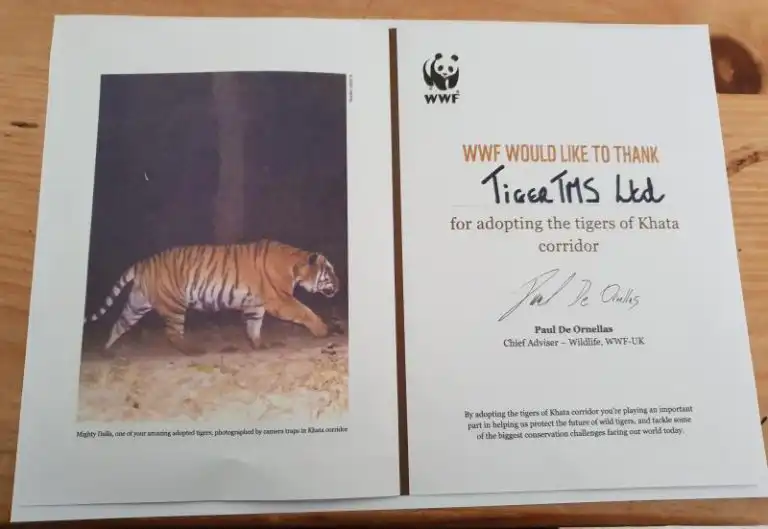Enhancing performance, productivity and the guest experience
Trusted by over 10,000 hotels worldwide
Enhancing performance, productivity and the guest experience
Trusted by over 10,000 hotels worldwide
Enhancing performance, productivity and the guest experience
Trusted by over 10,000 hotels worldwide
WWF Tiger Adoption
In conjunction with the WWF (www.wwf.org), TigerTMS has adopted 43 endangered Tigers in the Khata Corridor in Nepal.
Sadly, there are more tigers in captivity in the US than are left in the wild. There’s now estimated to be around 3,900 wild tigers globally. Tigers currently only occupy less than 6% of their global historical range, and populations have declined by around 95% since the beginning of the 20th century. The tiger is officially classed as endangered by the IUCN.
‘Animal adoptions like yours give a huge boost to our work. They not only help fund projects to work with local communities to monitor tiger movements, reduce poaching and help people to realise benefits from living in close proximity to wild tigers – but they also support our other vital work around the world.’
16/05/2024 - An update on our Tiger Adoption
Tiger Update
We’ve been delighted to receive an update about the tigers we support living in the Khata Corridor as part of the company’s ongoing support of the WWF.
As we have informed before in previous updates, the Khata Corridor is the passageway between Nepal and India and has been transformed from a degraded patch of land, into a thriving habitat capable of supporting growing numbers of tigers.
The legacy of resident tigress, Shivapothi (Shiva) continues to the delight of those involved in the WWF’s continuous restoration efforts, as a new tiger cub has been sighted belonging to Shivapothi’s third daughter.
This sighting signals further evidence that there’s hope new generations of tigers will keep this vital area of conservation alive and thriving for more years to come with the support of the WWF.
Did you know?
Tigers are very versatile. Living in many habitats from thick snow or dry heat, high mountain or river valley, their geographical habitats and conditions mean they have to adapt to a huge variety of habitats. In the Khata Corridor, where we post mostly about our tigers, the cats have sleek physiques and wide striped, bright orange coats; they have adapted for life in tropical and sub-tropical forests and grasslands. They regularly lie in watering holes to keep cool in the humid heat.
Further north, their larger fluffier cousins are built to survive the harsh conditions of the winter. To protect themselves against freezing temperatures, their fur is thicker and longer, they have longer fur around their necks and extra fur on their paws. Their coats tend to be lighter in colour, the orange less vivid, and their stripes thinner to enhance their camouflage among the forests.
These beautiful big cats truly are amazing – if you wish to find out more about supporting the great work of the WWF, visit: https://www.wwf.org.uk/learn/wildlife/tigers
05/09/2023 - An update on our Tiger Adoption
Tiger Update
Following our last adoption update reporting on Khalika and her two cubs, the camera trap set up by the WWF has recorded 13 tigers in the Khata Corridor. The team have identified that four of the young adult tigers spotted belong to a female tiger called Shivapothi (Shiva). This exciting news means that not only have more young tigers made it through their first two years, but they are also now independent and showing signs of breeding. A female tiger can have over a dozen young during her lifetime, many of which is hoped breed and go on to produce young themselves. So, by supporting just one tiger, we can protect future generations of tiger families.
Climate in Crisis
The impact of climate change and the rising temperature of earth have caused an increase in floods, forest fires, and heatwaves around the world, and over time this will only get worse and more severe if action isn’t taken now.
The WWF have been supporting communities in Nepal who are dealing with increasingly fierce forest fires, and whilst the country is no stranger to wildfires, recent years have seen unusually hot and dry conditions that have fuelled huge blazes across the country. We’re glad to hear many countries and their leaders have finally begun listening to the warnings of climate scientists and have put addressing climate change on the agenda.
We all have a part to play
This isn’t just about Tigers. By supporting the WWF, they can put in place the resources to support the local communities surrounding areas of the Khata Corridor. And it’s because of these initiatives, large areas of the forest are being restored enabling other struggling species such as the Asian elephant, to begin seeing their populations increasing. This is why all, organisations, and businesses large and small, ought to make simple but impactful adjustments to their everyday lifestyles and processes, to reduce their carbon emissions.
According to the WWF, transport is the UK’s biggest source of emissions and people are being encouraged to reduce flying, make the swap to electric vehicles, and encourage better and more frequent use of public transport.
Recently TigerTMS has examined our own carbon footprint (more on this soon) and we are in the process of putting in place some simple changes to improve our contribution to reducing our carbon footprint.
15/03/2022 - An update on our Tiger Adoption
We’re pleased to report Khalika’s two youngsters are thriving, although camera footage shows Kalika has trouble with her front paw and is limping. It’s likely the injury was sustained defending her cubs. She is otherwise healthy, and has done a fine job teaching her young to hunt. Kalika’s cubs are around 18 months now, so should have grown their permanent canine teeth and catch their own prey. At around two years old, they will leave Kalika to establish their own territories, perhaps in the Khata corridor or in the two protected areas it connects – Bardia National Park in Nepal and Katerniaghat Wildlife Sanctuary in India.
2022 is the lunar year of the tiger, and marks 12 years since all 13 tiger range countries committed to doubling their wild tiger numbers. This bold mission is known as TX2 and is one of the most ambitious conservation goals for a single species. Through the WWF, steady progress is being made; in Nepal a recent tiger survey shows an estimated 235 wild tigers, nearly twice the number estimated in 2009. Numbers are also increasing in Bhutan, China and India. The WWF have made great progress, but there is still much to be done. That is why TigerTMS is offering to adopt a tiger on behalf of every client who takes any of our software solutions between now and Easter. It’s just one small way to give a little back to the conservation of this great planet of ours.
For more information or to express interest in adopting your own tiger, visit: https://lnkd.in/dcapcbi8
14/10/2021 - New cubs for Kalika!
That was the great news we received in the latest update from the WWF about the Tigers we’ve adopted in the Khata corridor. Kalika has had two healthy cubs; these are the third set that she’s has produced since 2016. She’s doing a great job increasing the corridor’s tiger population – and it’s encouraging to hear her previous litter are still living in a part of her territory.
The cubs are still young and stay close to their mother – at 6 months they still rely on her heavily, they are usually weaned but can’t yet catch their own prey. Mum is doing all the hunting until the cubs get their permanent canine teeth.
As they grow and develop, they will watch her every move and learn all their survival skills from her. But their survival is dependent on the Khata corridor staying healthy and wildlife safe.
Nepal’s busy Postal Highway passes through a large section of the corridor, separating important wildlife areas. The traffic poses a significant threat to tigers and other animals trying to cross the road, as well as to motorists who could be hurt in a collision.
WWF have identified key crossing hotspots where wildlife is most at risk. The Nepalese government’s department of transport has agreed to fund road bridges over these hotspots, enabling animals to cross safely underneath.
It’s heartening to learn that conservation efforts are paying off and that the beautiful tigers can use ‘tiger tunnels’ to allow them to move to and fro at their leisure, while the traffic flows freely above them.
The WWF aims to help double the number of wild tigers to over 6,000 by 2022 – the next Chinese year of the tiger. For more information or to express interest in adopting your own tiger, visit: wwf.org.uk



